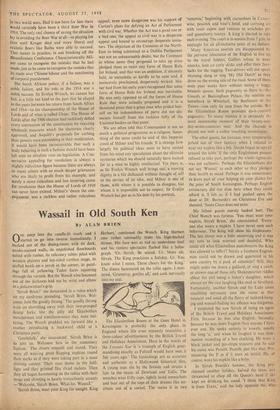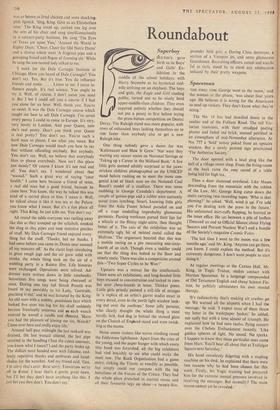Wassail in Old South Ken
By ALAN BRIEN ONE peep into the candle-lit murk and I started to go into reverse immediately. I backed out of the dining-room with its dark, smoke-stained walls, its unpolished floorboards tufted with rushes, its refectory tables piled with wooden platters and lop-sided earthen mugs, its stuffed hawk on a perch in the corner, its paint- ings full of yellowing Tudor faces squinting through the varnish. But the Wench who bosomed out of the darkness had me by wrist and elbow in a policewoman's grip.
`Sirrah Brien?' she demanded in a voice which set my eardrums pounding. `Sirrah Brien. Wel- come. Join the goodly throng.' The goodly throng Went on shovelling away with their two-pronged dental forks like the jolly old Elizabethan trenchermen and trencherwomen they were imi- tating. The Wench prodded me forward like a mother introducing a backward child at a Christmas party.
'Gentlefolk,' she announced. `Sirrah Brien is to join us. Welcome him in the customary fashion.' The diners stoppdd and stared. They were all wearing great flapping napkins round their necks as if they were taking part in a mass shaving contest. Their eyes shone in the half- light and they grinned like sliced melons. Then they all began hammering on the tables with their Mugs and shouting in hearty transatlantic accents —Welconte, Sirrah Brien. What-ho. Wassail.'
`Sirrah Brien, meet your King for tonight. King Herbert,' continued the Wench. King Herbert rose rather unsteadily from his high-backed throne. His face was as red as underdone beef and his rimless spectacles flashed like a helio- graph. 'Ur. Sirrah. Be seated. Ur. More ale. Sirrah. The King proclaims a holiday. Ur. You know what I mean. Three cheers for the King.' The diners hammered on the table again. I mut- tered, 'Gramercy, gentles all,' and sank nervously into my seat.
The Elizabethan Room at the Gore Hotel in Kensington is probably the only place in England where life even remotely resembles a three-colour advertisement by the British Travel and Holidays Association. Here in the words of the Toronto Star is 'a triumph of English gour- mandising exactly as Falstaff would have seen it 366 years, ago.' The furnishings are as accurate and authentic as a Hollywood historical film. A young man sits by the fireside and strums a lute to the music of Dowland and Tallis. The wenches wear frilly caps, tightly laced stomachers and bust out of the tops of their dresses like ice- cream out of a cornet. The menu is in two 'removes,' beginning with cucumbers in Canary wine, peacock and boar's head, and carrying ol with roast capon and venison to artichoke pit! and gooseberry.tanzye. A king is elected to rule each evening. The court is in session from 7 p.m. to midnight for an all-inclusive price of six dollars.
Many American tourists are disappointed by the perverse reluctance of the English to live up to the travel folders. Gaiters refuse to wear smocks, lean cii curly sticks and offer their fore- locks for the tugging. Taxi-drivers will not speak rhyming slang or sing 'My Old Dutch' as they drive on the wrong side of the road. Some of them even pass weeks here without seeing a soggy brussels sprout. Such pageantry as there is—th: Guards at Buckingham Palace, the sentries on horseback in Whitehall, the Beefeaters at the Tower—can only be seen from the outside. But the Elizabethan Room provides do-it-yourself pageantry. To many visitors it is obviously th: most memorable moment of their twenty-one- day-seven-countries tour. And the charade is played out with a rather touching earnestness.
The other guests, for instance, were temporarily jerked out of their fantasy when I refused to wear my napkin like a bib. Doubt began to spread around the table.' If the only Englishman present refused to take part, perhaps the whole rigmarok was not authentic. Perhaps the Elizabethans did not say 'Wassail' to each other as they pledged their health in mead. Perhaps it was unnecessary to leave part of your helping on your platter for the poor of South Kensington. Perhaps English aristocracy did not dine here when they could afford it. I felt as if I had pushed open the door at Dr. Barnardo's on Christmas Eve and shouted, 'Santa Claus does not exist.'
My fellow guests merely looked hurt. The Chief Wench was furious. 'You must wear your napkin, Sirrah Brien,' she commanded. 'Every- one else wears a napkin. I have never seen such behaviour. The King will show his displeasure.' The last threat was a little unnerving and it was my turn to look worried and doubtful. Who could tell what Elizabethan punishments the King was allowed to inflict? Surely a freeborn English- man could not be drawn and quartered in his own country by a pack of colonials? Still, they might make me dance a galliard, or sing a catch, or answer one of those silly Shakespearian riddles abbut the owl being a baker's daughter, which always set the cast laughing like mad at Stratford. Fortunately, another Sirrah and his Lady came stumbling nervously into the room at that moment and amid all the flurry of tankard-bang- ing and wassail-hailing my offence was forgotten.
I suspected the new Sirrah of being an agent of the. British Travel and Holidays Association.
First, because he was also English. Secondly, because he was more English than anyone I have ever met. He spoke entirely in vowels, mostly the long 'a,' and when he laughed it was slow- motion recording of a hen clucking. He wore a black jacket and pin-stripe trousers and he said his name was Psmith. Psmith, just like that. Pro- nouncing the P as if it were an initial. He, of course, wore his napkin like a baby.
In Sirrah Psmith's honour, the King pro- claimed another holiday, halved the taxes an I threatened to chop off the Queen's head if sir kept on drinking his mead. 'I think that King is from Texas,' said the lady opposite me, who was as brown as fried chicken and wore shocking- pink lipstick. 'Sing, King. Give us an Elizabethan tune.' The King stood up, cocked one leg over the arm of his chair and sang unselfconsciously in a concert-party baritone. He sang 'The Eyes of Texas are upon You,' Around the World in Eighty Days,"Cheer, Cheer for Old Notre Dame' and a chorus which went 'A fragrant pipe and a gossiping friend and flagon of foaming ale.' While he sang the sun-tanned lady talked to me.
'I work for the Dale Carnegie Institute in Chicago. Have you heard of Dale Carnegie? You don't say. Yes. But it's true. You do influence friends and make. . . . Listen to me. I mean in- fluence people. It's real science. You ought to try it. Well, of course, I don't mean you need it. But I bet I could sell you a course if I had you alone for an hour. Well, thank you. You're so sweet. It was the Dale Carnegie course which taught me how to sell Dale Carnegie. I've saved every penny I could to come to Europe. It's very, very lovely in London. And your Queen, now she's real pretty. Don't you think your Queen is real pretty? You don't say. You're such a hard man to please. I see what you mean. But now Dale Carnegie would teach you how to say that without offending anybody. But anybody. You don't say. Well, we believe that everybody likes to please everybody. Now isn't this place just dandy? Of course I know it's not real.and all. You don't say. I wondered about that "wassail." Such a great way of saying "your health." I came here because a friend of mine, a real old man but a good friend, because he came here. You know, the way he talked this was kind of a sacred place to him. I mean it. Well, he talked about it like it was tea at the Palace, you know what I mean. But it's a fun place all right. That King, he just kills me. You don't say.'
All round the table everyone was rattling away like this as they scooped up the syllabub, smoked the shag in clay pipes and took tentative pinches of snuff. My Dale Carnegie friend enjoyed every- thing but the snuff. 'Thanks, but no thanks. I had some before you came in-. Damn near sneezed all my mascara off.' As the claret kept circulating in great rough jugs and the air grew solid with smoke, the whole thing took on the air of a wedding party in a Raimu film. Life histories were exchanged. Operations were relived. Ad- dresses were written down in little notebooks. Sometimes five songs were being chorused at once. During one tiny lull Sirrah Psmith was heard to say peevishly to his Lady, 'Gertrude, pinching is out,' and he was lectured by the King. An old man with a wobbly, pendulous face which looked five sizes too big for his skull suddenly became frantically amorous and as each wench entered he waved a candle and shouted, 'Have you had the pleasure of kissing me yet, Wench? Come over here and really enjoy life.'
Around half-past midnight the last tankard was drained, the last wassail uttered, the last pipe secreted in the handbag Oust the cutest souvenir, you know what I mean?') and the party broke up.
The dollars were handed over with fulsome, end- lessly repetitive thanks and embraces and hand- shakes for the wenches. And my friend said, 'Gee, I'm sorry that's over. Real sorry. Tomorrow we're off to Rome. I hear that's a pretty great town, but I'll bet they don't have anything like this. I just bet you they don't. You don't say.'































 Previous page
Previous page